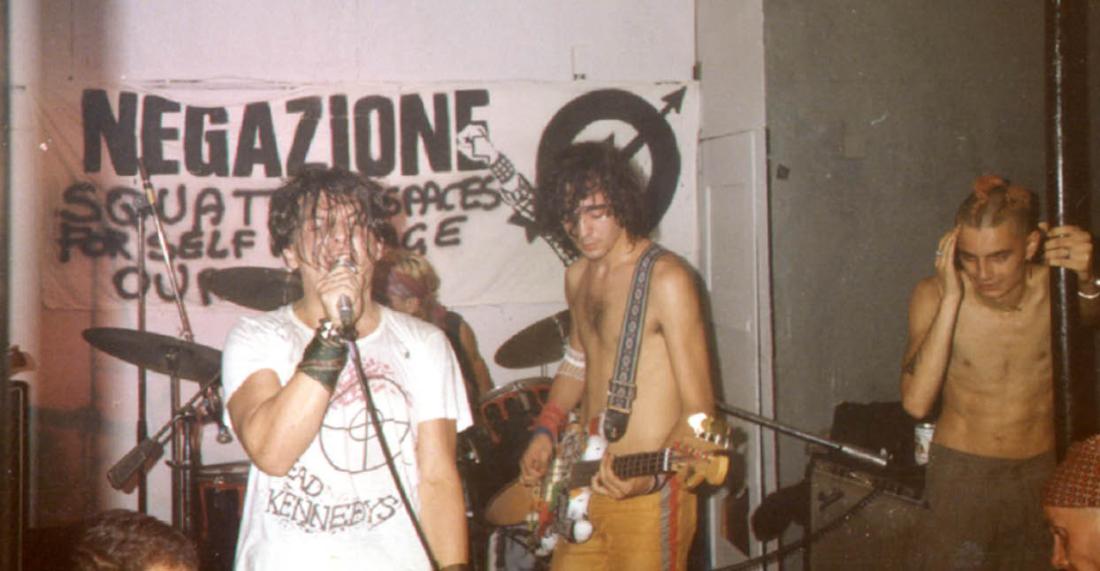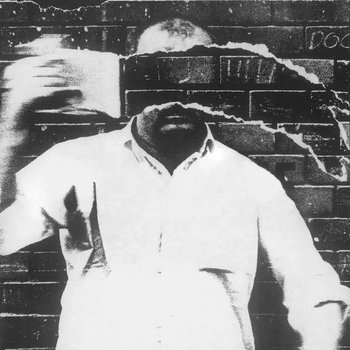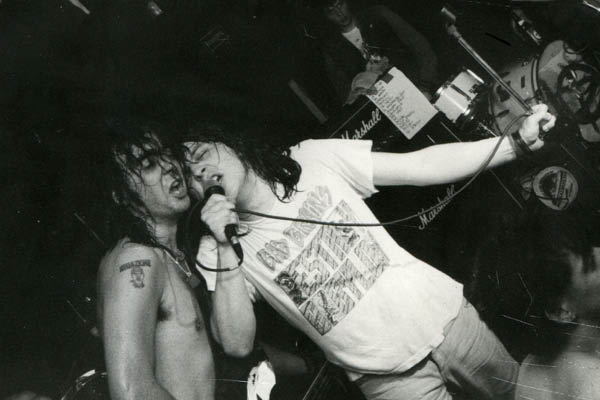
 Towards the end of Italian hardcore punk band Negazione‘s 1986 debut Lo Spirito Continua—the title translates to “the spirit lives on”—frontman Guido “Zazzo” Sassola lingers on the eponymous phrase in his lyrics. He stresses each syllable attentively at first, then pants them over anxious, needly guitar riffs and swift, powerful drum beats. Eventually, the three words explode into a screeching scream, a call to arms bursting in concert with the full group.
Towards the end of Italian hardcore punk band Negazione‘s 1986 debut Lo Spirito Continua—the title translates to “the spirit lives on”—frontman Guido “Zazzo” Sassola lingers on the eponymous phrase in his lyrics. He stresses each syllable attentively at first, then pants them over anxious, needly guitar riffs and swift, powerful drum beats. Eventually, the three words explode into a screeching scream, a call to arms bursting in concert with the full group.


You can still find “Lo spirito continua” written with white-out on the studded jackets of young Italian punks—often situated alongside patches for Wretched and Nerorgasmo, two other beloved ‘80s hardcore bands from the boot-shaped peninsula. Italy’s punk scene has been so active and eclectic for decades that its influence has been felt across the world (as an example, in the 2000s, several Japanese bands, like Isterismo and Tomorrow, wrote their lyrics in Italian, attempting to emulate some of the Italian hardcore groups they loved). Of course, the current Italian hardcore scene owes a lot to the ’80s as well, with bands such as Tetro Pugnale, Impulso, Lucta, and many more drawing influence from both the sound and the aesthetics of those years.
The furious, timeless urgency that marked Negazione’s earliest works makes them still an ideal introduction for anyone seeking a way into Italian punk music, but the Turin-based group are also notable for the way in which their style patiently but radically shifted over the course of nine years, from 1983 to 1992. As the band matured, their furious take on hardcore gave way into a more accessible, melodic approach that appealed not only to punks, but to skaters, metalheads, and other outside circles—while also keeping their original soul intact.
Lo Spirito Continua is the centerpiece of the four-piece’s discography. Rather than a mere imitation of British or American styles, it sounds more like a ferocious regression of hard rock, distilling it down to its essential elements and speeding it up to a breakneck pace. On tracks like “La Vittoria Della Sconfitta” and “Qualcosa Scompare,” the guitar solos are quick and jarring, playing off of Sassola’s impassioned delivery.

The album is also the meeting point between the band’s wild punk beginnings and the more melodic sound of their early ’90s works. “Tutti Pazzi,” released in 1984 on a 7-inch of the same name, is the song that better represents the first phase, and still now remains the introduction to Negazione for many. It’s a cacophonous track, recklessly sustained by a guitar that sounds more like a metal grater over an out-of-control drum rhythm, while Sassola goes ballistic, cheering to the metaphorical death of those who are trapped in their tedious routines: “Tutti felici, tutti contenti, state morendo / Tutti pazzi, tutti pazzi, tutti morti” (“Everyone’s happy, everyone’s pleased, you’re all dying / Everyone’s crazy, everyone’s crazy, everyone’s dead”). The band revived the same themes in a darker and more reflective manner on Condannati A Morte Nel Vostro Quieto Vivere, a short, intense EP released one year later; it features one of Negazione’s most memorable songs, “Tutto Dentro,” a hymn to introversion built on an emotional guitar riff that evolves into a claustrophobic vortex of desperate screams.
Towards the end of the ’80s, the four-piece continued to sand down the sharpness of their sound in favor of an even more melodic approach. They also started writing their lyrics primarily in English, though it’s the songs written in their native tongue that stuck with their ever-growing international circle of fans. “Il Giorno Del Sole” (from 1988’s Little Dreamer) and “Brucia Di Vita” (from 1990’s 100%), for example, remain two of the most loved tracks by the band. The first is the Negazione song you would sing around a bonfire, a sort of pastoral hardcore track where an acoustic guitar accompanies a fast punk rock rhythm; the second is a classic punk anthem, an optimistic ode to life—so distant from the raving gloom of their beginnings.
As is often the case with punk, though, recordings are secondary to live performance. That’s part of the reason why Negazione have recently released a series of rare live recordings to celebrate their years as a band. “The recordings do feel like live records,” explains guitar player Roberto “Tax” Farano. “They’re still faithful to the true nature of our shows, with all of our mistakes and uncertainties, but most of all our energy and emotions.” Each of the live recordings come with a digital booklet that explains the context of each show, offering a glimpse into Negazione’s history and world.

“Each show is a story of its own,” continues Farano, “and each is representative of the many different moments the band went through. Maybe the most significant one is Rock Skate Party 1990. It happened right before we left for a very long trip, first to the Netherlands to record 100%, and later on to our first U.S. tour with D.O.A. We wanted to say goodbye to everyone as if we were a big family, the way Marco [Mathieu, Negazione’s bass player] emotionally does when he announces ‘Lo Spirito Continua,’ the last song we played that night.” Then the song starts, and 28 years later its words still echo, true to their promise.







